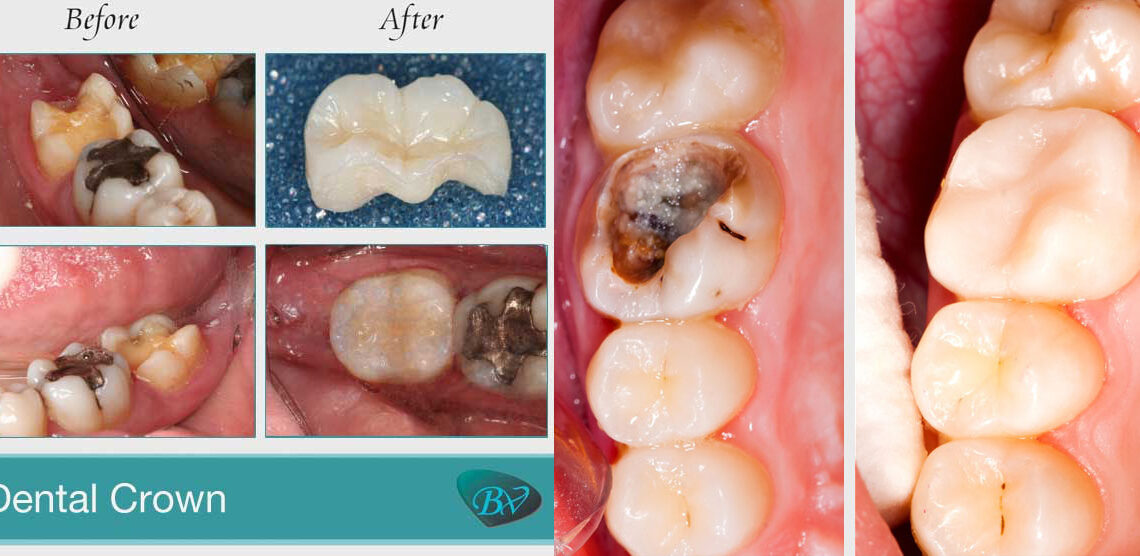Few things are worse than tooth pain, and you may be dismayed to discover that you experience discomfort with your tooth after a Beverly Hills porcelain crown is placed. After all, you searched for the best dental crown near me and got the restoration to stop pain that occurred from decay or a fractured tooth. The good news is that most pain from a dental crown is easily treatable with simple methods, and you can take these steps to get to the bottom of what is causing your pain following the placement of a crown.
Table of Contents
Common Causes of Sensitivity After a Dental Crown
There are many reasons why you may feel discomfort following a crown placement. For example, you may just have some initial swelling in the gums if your crown was just put on the tooth. During the first few days after a crown is placed, it is normal to have some pain as you bite into food due to the nerve or gum tissue being disturbed. This usually settles down within just a few days, and this type of pain is usually manageable by being careful as you eat and using over-the-counter pain relievers.
For a Beverly Hills porcelain crown that has been on your tooth for more than a few days, you may need to look a little deeper to determine the cause. For instance, the nerve of the tooth sometimes gets irritated after a crown placement to the point that a root canal is necessary to restore your comfort. Alternatively, you may have a misaligned bite that causes the crown to hit your other teeth to hard and send pain signals to the nerve.
Take Action Against Tooth Grinding
Many people are unaware that they grind their teeth at night. During tooth grinding, excessive forces are placed upon the dental crown that irritate the nerves and ligaments that support the tooth. Unfortunately, tooth grinding can also wear down the metal free crown Beverly Hills patients prefer in the visible parts of their mouth just as it does your natural teeth. If you suspect that you grind your teeth, then you can use a special nightguard to protect the crown as you sleep. This also helps you to avoid further damage to other teeth that are involved in the grinding process.
Brush and Floss Around the Crown
Proper care of the dental crown Beverly Hills dentists use on your teeth also helps to reduce pain. For example, you should always brush and floss around the crown to remove food debris that could get stuck beneath the gum line and contribute to pain and swelling near the crown. After a crown is placed, you may also have portions of your tooth root exposed along with the underlying dentin. These areas are more sensitive than the tougher enamel portion of your tooth. To ease the sensitivity, you can brush your teeth with special toothpastes such as Sensodine. These toothpastes contain special chemicals that help to coat the sensitive parts of your tooth so that you experience less pain and discomfort when you eat hot, cold or sugary foods.
Visit Beverly Hills Dentist for a Dental Exam
If home care strategies are not successful at alleviating your pain, then you need to return to the same dental clinic you found when you searched for the best dental crown near me. During an exam, your dentist can check for things such as a misaligned bite to determine the source of your pain. For example, there may be tooth decay that lies along the margin or underneath a dental crown that has been in your mouth for years. In this type of situation, you may need the crown to be removed so that a new filling can be placed before fitting another crown on the tooth. Alternatively, you could have a reaction to a metal restoration that requires you to switch to a metal free crown that Beverly Hills patients find is better for people with sensitivities to certain allergens.
Follow Through With Your Recommended Treatments
Finding out the cause of your pain is not enough. You must now use your knowledge to create a treatment plan that helps you keep your new or old crown comfortable. Talk to your dentist about your recommended course of treatment and make plans that help you stick to it. If you need to wear a nightguard, then consider placing it by your bed so that you remember to wear it each night. Alternatively, you may need to set an alarm to remind yourself to brush around the crown with a toothpaste designed to reduce sensitivity. If you do require a more serious treatment such as a root canal, then schedule your first appointment right away so that you do not procrastinate. Addressing dental crown discomfort right away gives you the best prognosis for successfully ending the pain.
Now that you have a dental crown, you may need to make a few adjustments to eliminate any leftover discomfort. If you have lingering pain beyond a few days after a crown placement or discover new pain around an old crown, then schedule your appointment for an exam to get to the bottom of what is causing the discomfort.



